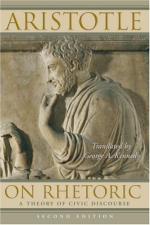
|
| Name: _________________________ | Period: ___________________ |
This quiz consists of 5 multiple choice and 5 short answer questions through Book II, Chapters 12-22.
Multiple Choice Questions
1. As explained by Aristotle in Book I, Chapter 10, what was the concern of the legal rhetorician?
(a) Only disproving wrongdoing.
(b) Either proving or disproving wrongdoing.
(c) Only proving wrongdoing.
(d) Neither proving nor disproving wrongdoing.
2. What was included in the special laws referenced by Aristotle?
(a) All of the logical opinions of a political body.
(b) Some of the explicit statutes of a political body.
(c) Some of the logical opinions of a political body.
(d) All of the explicit statutes of a political body.
3. As Aristotle explained, in which situations would rhetoric be useful?
(a) Situations where dialectic would be understood.
(b) Situations where dialectic would be misunderstood.
(c) Situations where dialectic would also be appropriate.
(d) Situations where dialectic would be inappropriate.
4. As explained by Aristotle in Book II, Chapter 18, what was political argumentation concerned with?
(a) Past events.
(b) Both past and future events.
(c) Future events.
(d) Neither past nor future events.
5. When did Aristotle think "what is good" made one happy?
(a) Never.
(b) Always.
(c) Most of the time.
(d) Occasionally.
Short Answer Questions
1. Based on Aristotle's explanation of the wealthy, how did wealthy people view the opinions of others about money?
2. Who did Aristotle think calmness was felt towards?
3. How did Aristotle define a maxim?
4. In addition to the relationships with other countries, what other part of war and peace did Aristotle explain?
5. Why did Aristotle think the completion of a difficult task was pleasant?
|
This section contains 405 words (approx. 2 pages at 300 words per page) |

|




